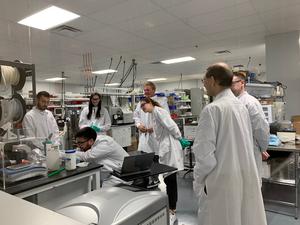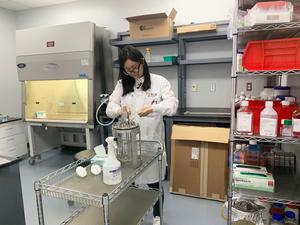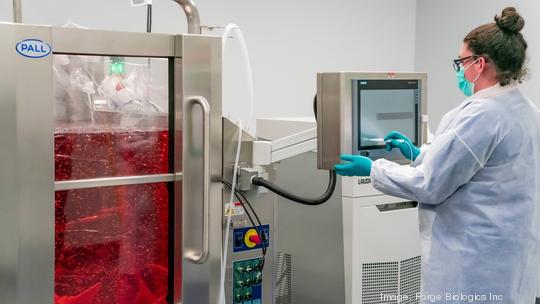
Forge Biologics Inc. has raised another $90 million in venture capital – at an increased valuation – during a tough year for biotech, largely because its growing client list for manufacturing the materials needed for most gene therapies, CEO Timothy Miller said.
"For us business has been really great," he said.
Drive Capital LLC, which was an original investor in the Grove City startup and recently raised $1 billion in two new funds, co-led the Series C with Aisling Capital and an undisclosed investor. New York City-based Aisling is a $1.8 billion firm that focuses on the life sciences, according to its website.
The two-year-old Forge, which also develops proprietary gene therapies, has raised a cumulative $330 million, and earlier this year added an $80 million credit line toward building out its 200,000-square-foot cleanroom manufacturing facility. It's part of Central Ohio's growing regenerative medicine cluster.
"We’re able to raise money because we met or exceeded all expectations from the previous raises," Miller said in an interview. "That helps build investor confidence, and really that’s a function of client confidence."
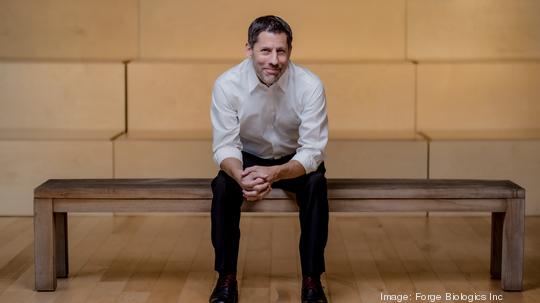
The company is not releasing its current valuation or revenue. Forge has grown to 255 employees, adding 50 to 75 over the next year, aiming for a goal of 400.
Worldwide biotech fundraising, like that for other venture-backed tech, has slowed from record-breaking highs in 2021, according to Fierce Biotech, although there have been other large rounds – including a $300 million one announced Tuesday. At the same time, so many public and private biotech companies are announcing job cuts that the publication reports it can't cover them all, instead introducing a "layoff tracker."
"Forge is bucking that trend," Miller said.
Part of what's holding other companies back is a manufacturing bottleneck in the industry – the very gap Forge is working to fill.
“We have confidence in the caliber of leadership at Forge, their technical expertise at all levels, and the meticulous attention to detail in every facet of the business,” Dr. Andrew Schiff, Aisling managing partner, said in a news release. “The gene therapy industry has been constrained by technical, operational, and capacity constraints, and Forge is poised to tackle each of those areas to alleviate the manufacturing bottleneck as they set out to do.”
An "unprecedented" 400 potential therapies are in various stages of seeking regulatory approval, Miller said, but they need genetic material and viruses to run their clinical trials. And they'll need positive results from clinical trials to make their valuations rise.
"It’s a tough market. The premise behind 95% of the gene therapy companies out there is completely intact and moving forward," Miller said. "(As clinical data gets released), it's really going to be an interesting couple of months, because you’ll see the biotech market start to turn (positive)."
Forge has more than two dozen clients, including large public pharmaceutical companies, universities, private startups and small family foundations backing research into rare genetic diseases. The company has an 18-month head start on most manufacturing competitors and is among the largest dedicated to making the type of non-disease-causing virus most preferred to deliver a genetic payload.
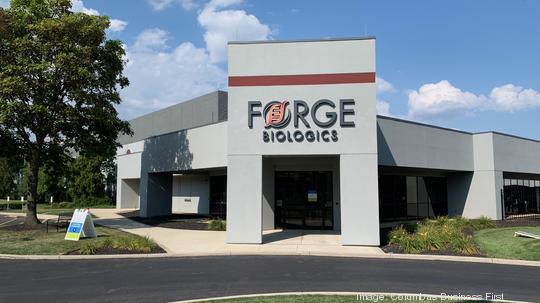
The facility so far has 20 cleanroom suites with bioreactors ranging from 50-liter capacity for the very earliest research stages to 1,000 liters, enough for starting clinical trials. This spring, Forge installed 5,000-liter vessels inside metal frames 16 feet tall, which only came on the market last year and have not yet been used for gene therapy. They're undergoing testing and certification toward being able to start production in 2023 – enough for commercial production.
The round is going toward adding products and services clients have asked for, Miller said, including Forge's proprietary lines of cells. The actual "factory workers" of the operation, the cells grow and multiply, then host and produce the viruses in the reactors.
“Forge has grown tremendously over the last two years, hiring experienced talent and scaling the facility, technology, and client offerings according to their unique hybrid business model,” Molly Bonakdarpour, Drive Capital general partner, said in the release. “We believe that Forge is becoming an established leader in gene therapy manufacturing, consistent with Drive Capital’s focus to build and support market-defining companies.”
Meanwhile, the first patient has been treated with Forge's own gene therapy candidate for Krabbe disease, a missing gene that fatally affects development and function of the nervous system. After about six months, the patient has improved muscle activity and brain development compared to others with the condition, according to a release.
